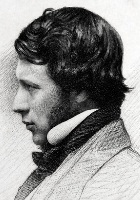Alexander Smith
Alexander Smith Poems
THE fierce exulting worlds, the motes in rays,
The churlish thistles, scented briers,
The wind-swept bluebells on the sunny braes,
Down to the central fires,
...
THE BROKEN moon lay in the autumn sky,
And I lay at thy feet;
You bent above me; in the silence I
Could hear my wild heart beat.
...
Walter. I HAVE a strain of a departed bard;
One who was born too late into this world.
A mighty day was past, and he saw nought
...
ON the Sabbath-day,
Through the churchyard old and gray,
Over the crisp and yellow leaves I held my rustling way;
And amid the words of mercy, falling on my soul like balms,
...
SING, poet, 'tis a merry world;
That cottage smoke is rolled and curled
In sport, that every moss
Is happy, every inch of soil: -
...
Alexander Smith Biography
a Scottish poet, and labelled as one of the Spasmodic School. Life and Works He was born in a thatched house in Kilmarnock, in the Scottish Lowlands south-west of Glasgow, the first of several children. His father, John Smith, was a Lowlander who worked as a designer of lace, calico prints, paisley patterns, and muslins. His mother Christina Murray Smith was of Highland extraction and, together with a Highland servant girl, first introduced him to Gaelic songs and Scottish legends. Being too poor to send him to college, his parents placed him in a linen factory in Glasgow to follow his father's trade of a pattern designer. His early poems appeared in the Glasgow Citizen, in whose editor, James Hedderwick, he found a friend. A Life Drama and other Poems (1853) was a work of promise, ran through several editions, and gained Smith the appointment of secretary to Edinburgh University in 1854. As a poet he was one of the leading representatives of what was called the "Spasmodic" School, now fallen into oblivion. Smith, P.J. Bailey and Sydney Dobell were satirized by W. E. Aytoun in 1854 in Firmilian: a Spasmodic Tragedy. In the same year Sydney Dobell came to Edinburgh, and an acquaintanceship at once sprang up between the two, which resulted in their collaboration in a book of War Sonnets (1855), inspired by the Crimean War. He also published City Poems (1857) and Edwin of Northumbria Edwin of Deira (1861), a Northumbrian epic poem. Although his early work A Life Drama was highly praised, his poetry was later less well thought of and he was ridiculed as being a Spasmodic. Smith turned his attention to prose, and published Dreamthorp: Essays written in the Country (1863) and A Summer in Skye (1865). He wrote two novels, Miss Dona M'Quarrie (18??), and his last work Alfred Hagart's Household (1866) which ran first through Good Words. He died in Wardie, near Edinburgh. A memoir of Smith by P. P. Alexander was prefixed to a volume entitled Last Leaves. See also Brisbane's Early Years Of Alexander Smith (1869) (but be aware that Brisbane's is not a scholarly work and contains errors of fact).)
The Best Poem Of Alexander Smith
Love
THE fierce exulting worlds, the motes in rays,
The churlish thistles, scented briers,
The wind-swept bluebells on the sunny braes,
Down to the central fires,
Exist alike in Love. Love is a sea
Filling all the abysses dim
Of lornest space, in whose deeps regally
Suns and their bright broods swim.
This mighty sea of Love, with wondrous tides,
Is sternly just to sun and grain;
'Tis laving at this moment Saturn's sides,
'Tis in my blood and brain.
All things have something more than barren use;
There is a scent upon the brier,
A tremulous splendour in the autumn dews,
Cold morns are fringed with fire.
The clodded earth goes up in sweet-breath'd flowers;
In music dies poor human speech,
And into beauty blow those hearts of ours
When Love is born in each.
Daisies are white upon the churchyard sod,
Sweet tears the clouds lean down and give.
The world is very lovely. O my God,
I thank Thee that I live!
Alexander Smith Comments
Alexander Smith Quotes
I would rather be remembered by a song than by a victory.
To be occasionally quoted is the only fame I care for.
We are never happy; we can only remember that we were so once.
A man gazing on the stars is proverbially at the mercy of the puddles in the road.
A man's real possession is his memory. In nothing else is he rich, in nothing else is he poor.
If you wish to preserve your secret, wrap it up in frankness.
If the egotist is weak, his egotism is worthless. If the egotist is strong, acute, full of distinctive character, his egotism is precious, and remains a possession of the race.
